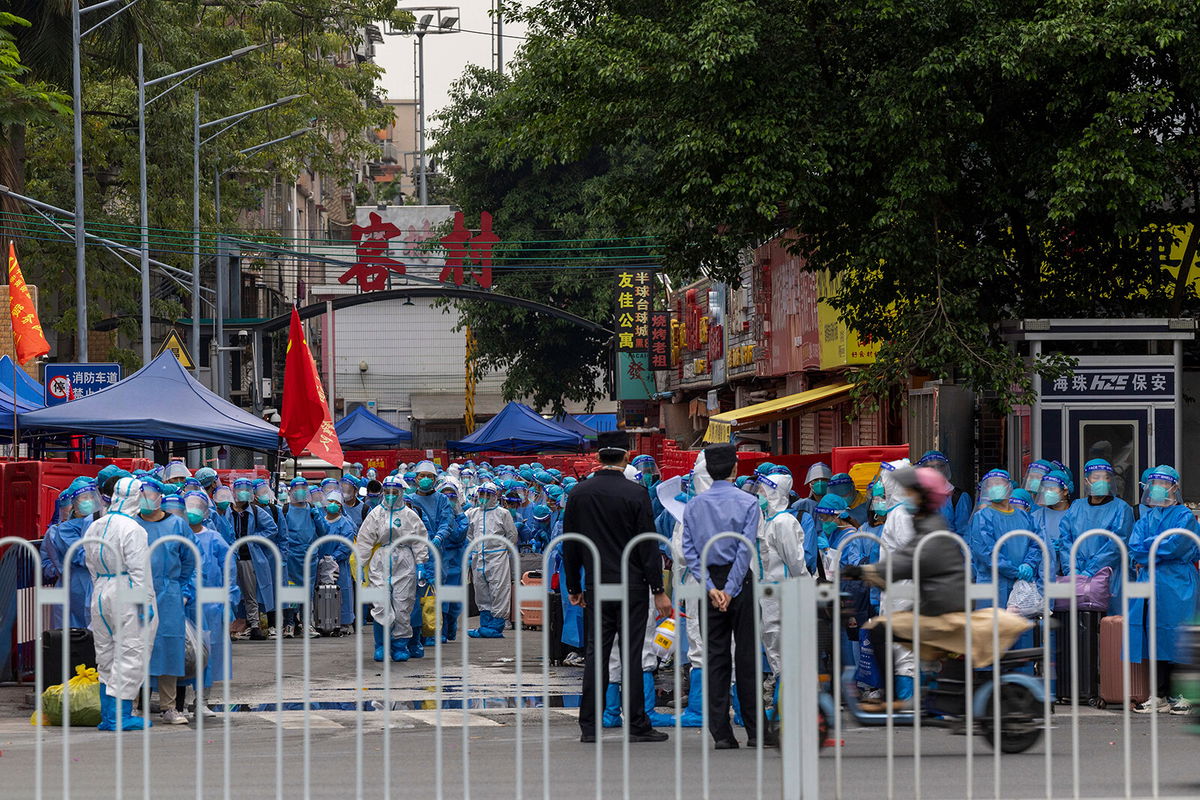China’s manufacturing hub Guangzhou locks down millions as Covid outbreak widens

Law enforcers wearing white hazmat suits prepare to transfer residents in blue protective clothing at a high-risk neighborhood in Guangzhou on November 5.
By Nectar Gan, CNN
China’s southern metropolis of Guangzhou has locked down more than 5 million residents, as authorities rush to stamp out a widening Covid outbreak and avoid activating the kind of citywide lockdown that devastated Shanghai earlier this year.
Guangzhou reported 3,007 local infections on Wednesday, accounting for over one third of new cases across China, which is experiencing a six-month high in infections nationwide.
The city of 19 million has become the epicenter of China’s latest Covid outbreak, logging more than 1,000 new cases — a relatively high figure by the country’s zero-Covid standards — for five straight days.
As the world moves away from the pandemic, China still insists on using snap lockdowns, mass testing, extensive contact-tracing and quarantines to stamp out infections as soon as they emerge. The zero-tolerance approach has faced increasing challenge from the highly transmissible Omicron variant, and its heavy economic and social costs have drawn mounting public backlash.
The ongoing outbreak is the worst since the start of the pandemic to have hit Guangzhou. The city is the capital of Guangdong province, which is a major economic powerhouse for China and a global manufacturing hub.
Most cases in Guangzhou have been centered in Haizhu district — a mostly residential urban district of 1.8 million people on the southern bank of the Pearl River. Haizhu was locked down last Saturday, with residents told not to leave home unless necessary and all public transport — from buses to subways — suspended. The lockdown was initially supposed to last for three days, but has since been extended to Friday.
Two more districts — with a combined population of 3.8 million — were locked down on Wednesday as the outbreak widened.
Residents in Liwan, an old district in the west of the city, woke to an order to stay at home unless absolutely necessary. College and universities in the district were told to lock down their campuses. Restaurant dining was banned and businesses ordered to shut, apart from those providing essential supplies.
On Wednesday afternoon, a third district, the outlying Panyu, announced a lockdown that will last till Sunday. The district also banned private vehicles and bicycles from the streets.
Starting from Thursday, all primary and middle schools in the city’s eight urban districts are moving class online, with kindergartens closed. Tutoring classes, training institutions and daycare centers will also suspend services, the city’s education officials told a news conference Wednesday.
Mass testing has been rolled out in nine districts across the city, and more than 40 subway stations have been closed. Residents deemed close contacts of infected persons — which in China can range from neighbors to those living in the same building or even residential compound — have been transferred en masse to centralized quarantine facilities.
The outbreak has also led to mass cancellations at the Guangzhou Baiyun International Airport, one of the busiest in the country. As of Thursday morning, 85% of the nearly 1,000 flights arriving and departing from Guangzhou had been canceled, according to data from flight tracking company Variflight.
“At present, there is still the risk of community spread in non-risk areas, and the outbreak remains severe and complex,” Zhang Yi, deputy director of the Guangzhou municipal health commission, told a news conference Tuesday.
So far, the lockdown appears to be more targeted and less draconian than those seen in many other cities. While residents living in neighborhoods designated as high-risk cannot leave home, those in so-called low-risk areas within locked down districts can go out to buy groceries and other daily necessities.
But many fear a blanket, citywide lockdown could be imminent if the outbreak continues to spread. On WeChat, China’s super app, residents share charts comparing Guangzhou’s surging caseload with that of Shanghai’s in late March, in the days before the eastern financial hub’s bruising two-month lockdown.
Shanghai officials initially denied a citywide lockdown was necessary, but then imposed one after the city reported 3,500 daily infections.
Anticipating that worse is to come, many residents in Guangzhou have stocked up on food and other supplies. “I’ve been buying (groceries and snacks) online like crazy. I’ll probably end up eating leftovers for a month,” said one resident, whose area of Haizhu district was categorized as low-risk by authorities.
Others, angered by the restrictions and testing edicts, have taken to social media to vent their frustration. On Weibo, China’s Twitter-like platform, posts using slang and expletives in the local Cantonese dialect to criticize zero-Covid measures have proliferated, seemingly largely evading the eyes of online censors who do not understand it.
“I learn Cantonese curse words in real-time hot search everyday,” one Weibo user said.
Meanwhile local authorities nationwide are under pressure to ramp up Covid control measures despite mounting public frustration.
This week, videos of Covid workers dressed head to toe in hazmat suits beating up residents went viral online. Following an outcry, police in Linyi city, Shandong province said in a statement Tuesday that seven Covid workers had been detained following a clash with residents.
The-CNN-Wire
™ & © 2022 Cable News Network, Inc., a Warner Bros. Discovery Company. All rights reserved.
CNN’s Beijing bureau and Wayne Chang contributed to reporting.